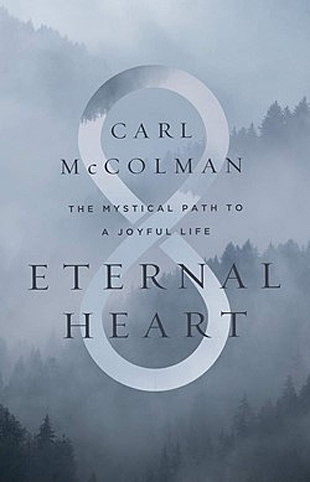With a series of important books — including The Big Book of Christian Mysticism — Carl McColman has shown himself to be the inheritor of the spirit of the Christian scholar and teacher Evelyn Underhill. She wrote the accessible Mysticism in 1911, beginning the modern quest for a relevant mysticism.
Eternal Heart is McColman’s latest work. Without blurring his core Christian commitments (he reiterates these again clearly), McColman also reaches beyond Christian mystics into the teachings of Krishnamurti, Mirabai, Rumi, Henry David Thoreau, Rabbi Lawrence Kushner, Sylvia Boorstein, Starhawk, and many others — even into popular musicians such as The Beatles and Peter Gabriel.
Our favorite parts of this book are when McColman describes what a great mystical teacher has taught and then interprets it in his own language in the situations of twenty-first century life, showing how to use the wisdom daily. He does this, for instance, with Julian of Norwich on love, adding his own teaching to hers:
“The spiritual heart is bigger on the inside than on the outside thanks to the miracle of love. Heavenly love not only reveals the presence of God but forms the very architecture of the soul. Physically we are beings made of stardust, and spiritually we are beings fashioned of the very love of God. The deeper we move into love, the larger it gets. Every subatomic particle unfolds a universe, and love scales all the way down and all the way up.”
“If love, the firstfruit of the Spirit, is the pure light from which the colorful lights of all the other fruits are refracted, can any of the other fruits especially be paired with the gift of love? Yes — I believe the fruit of goodness inspires the hunger for righteousness, the blossoming of love, and the ever-expanding heart.”
McColman does this with a variety of teachers in a later chapter on the topic of regular prayer or meditation. He reveals how such “heart practice,” regardless of spiritual tradition, is not only a necessity for mystical living but a new way to understand eternity.
As the title of the book suggests, “heart” is a recurring theme throughout. For example, the opening chapter of Eternal Heart offers:
“The first gift of the heart is its capacity for pilgrimage, whether physical or spiritual. Even if you live your entire life in one place (and there’s something to be said for that), your heart may still be called to wander, in wonder. Responding to that call is the first step toward finding the hidden/present divine.”
“Heart Practices” — what might otherwise be called “spiritual practices” — are offered throughout the chapters. With the language of “heart” it becomes clearer how all of what happens in mysticism is to be transforming of body and soul.
We agree, and we think you will find much to help your own quest in Carl McColman’s new book.
